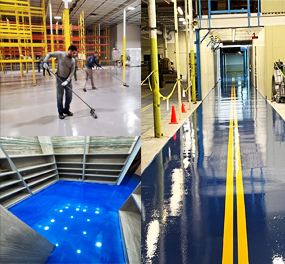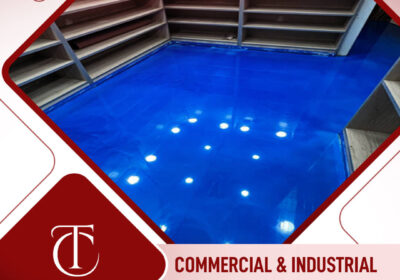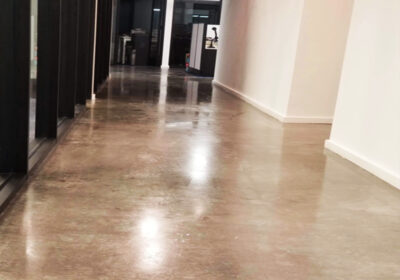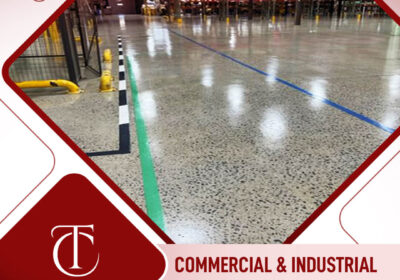Top 5 Commercial Flooring Types: Solutions for Your Business floor

Top 5 Commercial Flooring Types: Solutions for Your Business floor
Choosing the right flooring for commercial spaces in New Jersey can significantly impact both aesthetics and functionality. Commercial flooring must endure heavy foot traffic, resist wear and tear, and maintain its appearance over time. In this article, we’ll explore the top five commercial flooring types that offer durable solutions for businesses in NJ.
1. Polished Concrete
Polished concrete is a popular choice for commercial spaces such as shopping complexes, corporate offices, retail spaces, supermarkets, and warehouses. Its seamless finish, ease of maintenance, and durability make it an ideal option. Polished concrete reflects light, creating a bright and welcoming environment.
2. Stained Concrete
Stained concrete adds a decorative touch to traditional concrete floors. By applying stains, businesses can achieve various colors and patterns, enhancing the overall look of the space. This type of flooring is not only aesthetically pleasing but also durable and easy to maintain.
3. Epoxy Flooring
Epoxy flooring is known for its high durability and resistance to chemicals, abrasion, and heavy traffic. It is widely used in industrial settings, garages, hospitals, and commercial kitchens. Epoxy floors are available in a variety of colors and finishes, allowing businesses to customize their appearance.
4. Vinyl Composite Tile (VCT)
Vinyl composite tile is a durable and cost-effective flooring option commonly used in schools, offices, and healthcare facilities. VCT is easy to install, maintain, and replace, making it a practical choice for high-traffic areas. It comes in various designs and colors, allowing for creative customization.
5. Carpet Tiles
Carpet tiles are a flexible and versatile flooring option for commercial spaces. They offer comfort, noise reduction, and easy maintenance. Carpet tiles are ideal for offices, hotels, and educational institutions. They can be replaced individually if damaged, reducing the need for complete flooring replacement.
What is the Difference Between Residential and Commercial Flooring?
The primary difference between residential and commercial flooring lies in durability. Commercial flooring is designed to withstand high foot traffic, resist stains, and endure various environmental factors. On the other hand, residential flooring focuses more on aesthetics and comfort. The materials used in commercial flooring are often more robust and long-lasting compared to those used in residential settings.
Cost-Efficiency of Commercial Flooring
While the initial cost of commercial flooring may be higher than residential options, it proves to be more cost-effective in the long run. Due to its durability, commercial flooring requires fewer repairs and replacements, ultimately saving businesses money on maintenance.
The Toughest Commercial Flooring Options
Porcelain tile flooring is one of the most durable options for high-traffic commercial spaces. Made from refined, heated clay, porcelain tiles are stain-proof, waterproof, and scratch-proof. They are perfect for schools, restaurants, and other heavy-traffic areas.
Choosing the Right Commercial Flooring
When selecting commercial flooring, consider the following factors:
- Application: Determine where the flooring will be installed and its primary function.
- Durability: Assess the flooring’s resistance to wear, stains, and environmental factors.
- Installation Time: Consider the time required for installation and its impact on business operations.
- Maintenance: Evaluate the ease of cleaning and maintaining the flooring.
Commercial vs. Industrial Flooring
The main difference between commercial and industrial flooring is aesthetics. Industrial floors are utilitarian and prioritize functionality over appearance. They are designed to handle heavy machinery, chemicals, and frequent cleanings. In contrast, commercial floors are designed to be both functional and visually appealing, catering to spaces like offices, retail stores, and hotels.
Conclusion
Selecting the right commercial flooring for your business in NJ involves evaluating various factors such as durability, cost-efficiency, and aesthetics. Polished concrete, stained concrete, epoxy flooring, vinyl composite tile, and carpet tiles are all excellent options that provide durability and style. By choosing the appropriate flooring, businesses can create an inviting environment while ensuring long-lasting performance.
Contact Information
![]() Location: Serving Central and Northern NJ, including South Jersey.
Location: Serving Central and Northern NJ, including South Jersey.
![]() Call Now: +1 (201) 315-2633
Call Now: +1 (201) 315-2633
![]() Email: sales@yourcompanyname.com
Email: sales@yourcompanyname.com
Keywords
Commercial flooring, industrial flooring, NJ flooring solutions, polished concrete, stained concrete, epoxy flooring, vinyl composite tile, VCT flooring, carpet tiles, floor durability, high-traffic flooring, commercial vs residential flooring, cost-efficient flooring, porcelain tile flooring, commercial floor maintenance, durable commercial floors, industrial concrete floors, commercial tile, heavy-duty flooring, floor underlayment, concrete finishes, retail flooring, office flooring, healthcare flooring, educational flooring, garage flooring, hospital flooring, commercial spaces flooring, noise reduction flooring, flexible flooring options, customized flooring, seamless concrete floors, chemical-resistant flooring, abrasion-resistant flooring, flooring installation, environmental factors flooring, comfort flooring, aesthetic flooring, flooring replacement, utilitarian flooring, light-reflective flooring, commercial kitchen flooring.



